
-
 Rubio defends Russia talks and criticism of Zelensky
Rubio defends Russia talks and criticism of Zelensky
-
Only one in six Japanese citizens has a passport, data shows

-
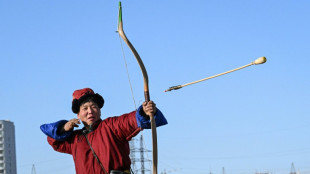 Mongolians warm up on culture at new winter festival
Mongolians warm up on culture at new winter festival
-
Asian markets advance as Alibaba fuels Hong Kong tech rally

-
 Japan cabinet approves 'emergency' urban bear shootings
Japan cabinet approves 'emergency' urban bear shootings
-
Australia says China warned of 'live fire' drill off east coast

-
 Pakistan face India in Champions Trophy clash with no room for error
Pakistan face India in Champions Trophy clash with no room for error
-
Nepal community fights to save sacred forests from cable cars

-
 Trump tariffs leave WTO adrift in eye of the storm
Trump tariffs leave WTO adrift in eye of the storm
-
'Just two glasses': In Turkey, lives shattered by bootleg alcohol
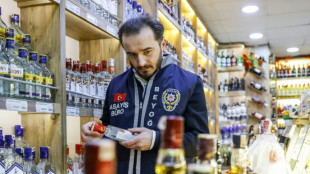
-
 Nissan shares jump 11% on reported plan to seek Tesla investment
Nissan shares jump 11% on reported plan to seek Tesla investment
-
LeBron, Reaves dazzle as Lakers sink Blazers

-
 Cambodia to resume demining after US aid waiver
Cambodia to resume demining after US aid waiver
-
Canada enjoys emotional win as USA gets Olympic motivation

-
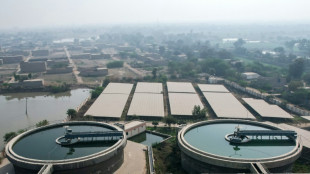 Trump aid cut imperils water scheme in scorching Pakistan city
Trump aid cut imperils water scheme in scorching Pakistan city
-
Monaco battle to save season after Champions League exit

-
 Barcelona face Las Palmas with Liga lead strength test beckoning
Barcelona face Las Palmas with Liga lead strength test beckoning
-
Just 17% of Japan citizens hold passport, data shows

-
 Canada beats USA to win heated Four Nations Face-Off final
Canada beats USA to win heated Four Nations Face-Off final
-
Netanyahu orders 'intensive' West Bank operations after Israel bus blasts

-
 Macario back to scoring ways as USA beat Colombia
Macario back to scoring ways as USA beat Colombia
-
Australia's Cummins targets IPL for return from injury

-
 Most Asian markets rise as traders pick over week of headlines
Most Asian markets rise as traders pick over week of headlines
-
US sends migrants from Guantanamo to Venezuela

-
 Japan's core inflation rate hits 19-month high
Japan's core inflation rate hits 19-month high
-
Trump aid cut imperils water scheme in Pakistan's hottest city
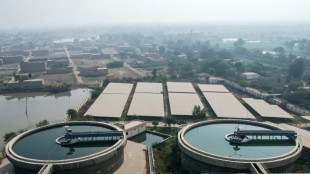
-
 Big-gun Wallabies 'add energy' to Brumbies' Super Rugby campaign
Big-gun Wallabies 'add energy' to Brumbies' Super Rugby campaign
-
Bus blasts rock central Israel in 'suspected terror attack'

-
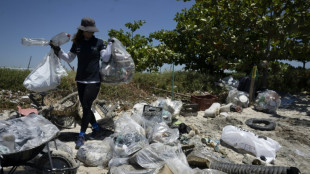 Fishermen, sailing champions clean up trash-covered Rio island
Fishermen, sailing champions clean up trash-covered Rio island
-
What is Brutalism? And why do architects hate 'The Brutalist'?

-
 How a 'forgotten' Minnesota monastery inspired 'The Brutalist'
How a 'forgotten' Minnesota monastery inspired 'The Brutalist'
-
People can spread bird flu to their cats, US study suggests

-
 Blues coach braced for 'extremely competitive' Super Rugby season
Blues coach braced for 'extremely competitive' Super Rugby season
-
Liverpool face wounded Man City as Premier League title race heats up

-
 Wallabies skipper Wilson extends Reds deal till 2029
Wallabies skipper Wilson extends Reds deal till 2029
-
Dodgers pitcher checked for concussion after head-shot

-
 Musk vows to 'fix' X feature over Ukraine and Zelensky
Musk vows to 'fix' X feature over Ukraine and Zelensky
-
Japan's core inflation rate hits 3.2% in January

-
 Chainsaw-wielding Musk savors Trump's return to White House
Chainsaw-wielding Musk savors Trump's return to White House
-
Trump meets with Tiger, PIF and PGA Tour bosses to reunite golf

-
 Roma reach Europa League last 16 as 10-man Ajax scrape through
Roma reach Europa League last 16 as 10-man Ajax scrape through
-
MLS hoping for World Cup buzz in 30th season

-
 Bolivia's Morales launches 4th presidential bid, defying term limit
Bolivia's Morales launches 4th presidential bid, defying term limit
-
Harris Reed opens with 'rebellious' show at London Fashion Week opening

-
 Stocks mostly fall on tepid Walmart outlook, geopolitical worries
Stocks mostly fall on tepid Walmart outlook, geopolitical worries
-
Argentine court dismisses charges against 3 accused in death of singer Liam Payne

-
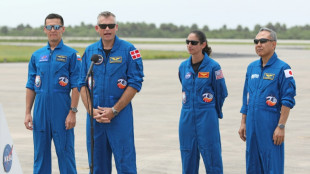 Musk in X spat with Danish astronaut over 'abandoned' ISS crew
Musk in X spat with Danish astronaut over 'abandoned' ISS crew
-
Bond franchise shake-up moves spy into Amazon stable

-
 New York seeks hundreds of millions of dollars in 'vaping epidemic' case
New York seeks hundreds of millions of dollars in 'vaping epidemic' case
-
Dybala double leads Roma into Europa League last 16


Teamwork key to smashing European doping networks: WADA investigations chief
A collaboration between the Serbian anti-doping agency and law enforcement operatives who seized 3,000 kilogrammes of performance-enhancing drugs and broke up an organised crime gang last year is "the future in the fight against doping", WADA's Director of Intelligence and Investigations Gunter Younger has told AFP.
The collaboration stemmed from a proposal from the World Anti-Doping Agency to the European Union in 2022 to assist with funding of a week-long workshop bringing together law enforcement officers from across Europe and anti-doping personnel from national agencies.
The Serbian gang -- eight members were arrested -- had brought in doping products with an estimated worth of three million euros ($3.1 million) from India, Serbia's anti-doping agency said.
Although the raids were carried out by the police, they acted on intelligence gathered by the Serbian agency.
Similar operations have been carried out in Poland -- which uncovered a laboratory capable of producing one million steroid pills a day -- and in Austria, Denmark, Germany and Greece.
"It is the future in the fight against doping, because without law enforcement, sport organisations are overstretched" in the battle against products brought into countries by organised crime groups, Younger told AFP.
Although anti-doping personnel do not actively participate in the raids, their involvement adds an edgier element to WADA's global image.
"It is not the perception of the public of what we are," Younger said.
WADA's image came under the microscope last year after it cleared 23 Chinese swimmers who had failed doping tests, accepting the Chinese authorities' explanation that they had eaten contaminated food.
A report into the case cleared WADA of showing "favouritism" although it was insufficient for the United States which withdrew funding from the global doping body this year.
This month, WADA has had to defend its handling of the doping case concerning world tennis number one Jannik Sinner, with some players complaining that the Italian has been given preferential treatment by receiving a three-month ban.
- ' Whistleblowers are the key' -
Younger said the collaboration between law enforcement and national doping agencies in Europe had quickly produced results.
He said he had hoped the EU-assisted workshop would spawn six operations but "it went through the roof" and WADA was now collaborating on over 100 across Europe.
In the raids so far, "law enforcement have seized 25 tonnes of performance-enhancing drugs," the 57-year-old German said.
"Around 25 underground laboratories were dismantled.
"Our teams in Europe made sure that more than 500 million doses of performance-enhancing drugs were prevented from coming onto the global market."
Younger, a former head of the Bavarian cybercrime and counterfeit currency departments who joined WADA in 2016, says it was easier to get the attention of law enforcement bodies when organised crime was involved.
"They see that organised crimes groups shift more and more from classical drugs like heroin and cocaine to performance-enhancing drugs." he said.
"Why? Because they can use the same supply routes", but make "higher profits".
"Also the detection rate is very low because law enforcement usually are not so interested in performance-enhancing drugs."
Being in possession of one kilogramme of cocaine could earn someone a jail sentence of several years in some countries.
On the other hand, "for one kilogramme of performance-enhancing drugs, you get probably a fine. So that is why it was logical an organised crime group would discover this area."
Younger impressed on the law enforcement officers that although doping products may not be a priority, allowing them into their countries could lead to more sinister activities.
"We told (them) that organised crime groups are very quick in identifying the weak spots in a system." he said.
"If your country is not reacting on that, they might use your country as a hub for others."
While the police get the satisfaction of cracking an organised crime ring, the main benefit for WADA is obtaining the identities of the intended clients for the doping products.
The raid in Greece uncovered a list of 11,000 clients. Not all are members of an athlete's entourage but even just one name can open the way to uncovering athletes who are doping.
"We are hoping to get data from them about athletes, support personnel, doctors," he said.
None of this would be possible, Younger said, without whistleblowers.
"You need to be very creative in how you find the evidence and whistleblowers are our key," he said.
"We have a very strong whistleblower programme. We get almost 500 reports per year, which is a very good result for us.
"This is why I think this collaboration with law enforcement with the power they have is so important.
"It is the future in the fight against doping, because without law enforcement, sport organisations are overstretched" in the fight against organised crime groups.
Younger said the workshop -- there are plans for one in Asia and Oceania -- could be a game changer.
"We had this morning another big seizure," he said. "Someone said it was triggered by your workshop.
"I mean, that's beautiful. What else can you wish for?"
C.Kovalenko--BTB


